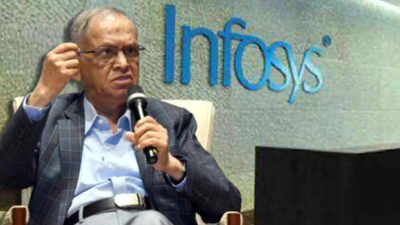- News
- Business News
- India Business News
- Now, Infosys prize only for those aged up to 40 years; Economics added as new category
Trending
Now, Infosys prize only for those aged up to 40 years; Economics added as new category

Narayan Murthy (Agencies photo)
BENGALURU: The Infosys Science Foundation (ISF) Wednesday announced a major revamp of the Infosys Prize, transitioning it from a mid-career award to an early-career prize aimed at recognizing rising stars in research and academia.
Under the new guidelines, the upper age limit for Infosys Prize winners has been revised to 40 years old. The move aims to reward potential and the promise of future achievement in cutting-edge research that benefits humanity.
"Since its inception 15 years ago, ISF has recognised and awarded 92 brilliant minds across disciplines in a demanding global environment," said Kris Gopalakrishnan, President, Infosys Science Foundation.
"This change stems from our vision to create a generation of young academicians passionate about scientific research, and provide a longer runway for individuals to develop impactful work," he added.
Infosys founder NR Narayana Murthy, said: "When we started the Prize, our desire was to create role models for young researchers to do inventions and innovations comparable with the rest of the world... As a very progressive, thinking, innovative organisation, we felt that the country is moving forward with more IITs, IISERs etc, and we must move forward with changing the model and creating a cut-off of 40 years."
Murthy cited examples of Albert Einstein, AK Ramanujan and others to say how some of the best inventions or innovations in STEM came when scientists were really young and further reiterate why ISF took the decision to change the age criteria.
The fundamental objective remains recognising exceptional research that improves lives and creates role models for aspiring Indian scientists, ISF said, adding that it, however, is introducing new requirements for international winners to spend time at Indian institutes to foster collaboration.
Prize winners based outside India must spend 30 days, across a maximum of two trips, at a host institute of their choice. The ISF hopes these exchanges will "spark conversations with research groups" and potentially lead to long-term partnerships.
The categories have also been updated, with Economics now a dedicated field separate from the broader Social Sciences category. From 2024, the six Infosys Prize categories are: Economics, Engineering & Computer Science, Humanities, Life Sciences, Mathematical Sciences, and Physical Sciences.
"We believe this redirection will help serve as a catalyst for future innovation and mobilize young individuals towards shaping a better tomorrow," Gopalakrishnan stated.
Under the new guidelines, the upper age limit for Infosys Prize winners has been revised to 40 years old. The move aims to reward potential and the promise of future achievement in cutting-edge research that benefits humanity.
"Since its inception 15 years ago, ISF has recognised and awarded 92 brilliant minds across disciplines in a demanding global environment," said Kris Gopalakrishnan, President, Infosys Science Foundation.
"This change stems from our vision to create a generation of young academicians passionate about scientific research, and provide a longer runway for individuals to develop impactful work," he added.
Infosys founder NR Narayana Murthy, said: "When we started the Prize, our desire was to create role models for young researchers to do inventions and innovations comparable with the rest of the world... As a very progressive, thinking, innovative organisation, we felt that the country is moving forward with more IITs, IISERs etc, and we must move forward with changing the model and creating a cut-off of 40 years."
Murthy cited examples of Albert Einstein, AK Ramanujan and others to say how some of the best inventions or innovations in STEM came when scientists were really young and further reiterate why ISF took the decision to change the age criteria.
The fundamental objective remains recognising exceptional research that improves lives and creates role models for aspiring Indian scientists, ISF said, adding that it, however, is introducing new requirements for international winners to spend time at Indian institutes to foster collaboration.
Prize winners based outside India must spend 30 days, across a maximum of two trips, at a host institute of their choice. The ISF hopes these exchanges will "spark conversations with research groups" and potentially lead to long-term partnerships.
The categories have also been updated, with Economics now a dedicated field separate from the broader Social Sciences category. From 2024, the six Infosys Prize categories are: Economics, Engineering & Computer Science, Humanities, Life Sciences, Mathematical Sciences, and Physical Sciences.
"We believe this redirection will help serve as a catalyst for future innovation and mobilize young individuals towards shaping a better tomorrow," Gopalakrishnan stated.
End of Article
FOLLOW US ON SOCIAL MEDIA
















